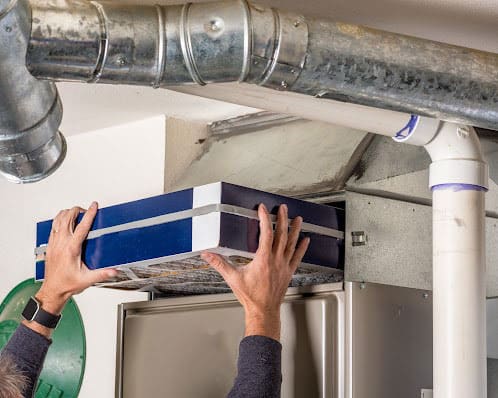
When it’s cold outside, your family can rely on your heating system to keep your home warm and snug. However, your furnace can break down when you need it the most and leave your family chilly and miserable. By keeping a keen eye on your unit, you can diagnose a failing furnace to prevent a total breakdown. Explore some indications of a faulty furnace below.
1. Age
The typical lifespan of a furnace is 15 to 20 years. Many things affect this lifespan, including the quality of installation, maintenance, and sizing. For example, a furnace that is too small for your home overworks and ages quickly as a result.
If you purchase an older home, the furnace may have already run its course. Check the system’s age or have a heating contractor inspect it thoroughly. Newer units feature a manufacturer’s date, which you can spot with little effort.
If you have an older furnace, look for the serial number on the metal door’s interior or the fan and fan blades. The first two digits on the number indicate the manufacture week, while the subsequent two digits indicate the year of manufacture.
A well-maintained furnace operates quite well in the first ten years. After this, repairs are common — especially during the last quarter of the unit’s lifespan. You can prolong your unit’s lifespan with timely inspections and repairs.
2. Insufficient Heating
A furnace that turns on but fails to heat your home as expected is a cause for concern. Sometimes, some parts of the house will be cold while others are warm. Dirty air filters are a common cause of insufficient heating. If this is the case, simply swap filters and enjoy improved comfort.
Other culprits, like leaky ductwork or a malfunctioned blower fan, require the attention of HVAC experts. HVAC professionals use special cleaning solvents and soft brushes to restore heating performance if the furnace’s A-coil has dust and mold buildup.
3. Strange Noises
While furnaces make some noise during regular operation, they emit unusual sounds when almost giving out. These noises include the following.
Banging and Booming
Delayed ignition causes your furnace to bang and boom when it kicks on. When your furnace works as it should, the pilot light or ignition system ignites the gas as soon as the gas valve opens. In the case of a defective ignition system, a small amount of unburned flammable gas accumulates in the combustion chamber, which makes a booming noise when it eventually ignites.
Burner malfunction, low gas pressure, and a defective igniter are some causes of delayed ignition. These issues require the specialized attention of an HVAC expert.
Dry Squealing
Worn belts or motor bearings cause annoying squealing sounds. While lubrication works in some cases, call a professional to replace badly worn bearings and belts.
Rattling
Rattling noises from your unit probably indicate loose parts. However, don’t attempt to tighten the parts yourself, as furnaces are complex mechanical appliances that require an expert diagnosis. Instead, turn off the system and contact an HVAC technician.
Humming
While you may ignore humming or buzzing noises, they often indicate something serious like a failing blower motor, blower motor capacitor, or inducer motor. A furnace pro is best equipped to identify and replace faulty electrical components.
Unfamiliar sounds may indicate that your furnace is overworking or a problem is developing. So, call HVAC technicians as soon as you detect unusual sounds.
4. Strange Odors
Furnace odors can indicate serious problems with your unit. For example, a rotten smell suggests a failed heat exchanger, which can channel dangerous amounts of carbon monoxide to your house. Call an HVAC pro immediately if you detect a foul odor from your unit.
If the unit smells like burning plastic, turn it off as some electrical components are likely getting scorched. Then, have an HVAC expert check if anything is overheating or burning.
5. High Heating Bills
Your furnace loses efficiency over time, particularly if not well maintained. An aging furnace also runs more frequently to keep your home comfortable, resulting in unusually high bills. While heating bills rise in winter, pay attention to any significant increase from last year’s winter.
A dirty filter is a typical cause of reduced energy efficiency. If you replace filters religiously, the issue can be clogged air vents or cracked blower motors. In other cases, your furnace is simply on its last leg, and a replacement saves you money from lower utility bills.
6. Water Leaks
If you have a newer furnace model, pooled water around the unit indicates a clogged condensate line. Repairing the condensate line is a complex task, so call an HVAC pro with the tools and experience to solve the leak.
Since older models lack condensation lines, water leaks arise from a malfunctioned heat exchanger. This is a dangerous occurrence that demands immediate diagnosis from a furnace technician.
Don’t wait until your furnace fails to contact an HVAC pro. Instead, watch out for the above issues and call our furnace experts at Steele Brothers Heating Inc. to keep your family warm and comfortable.
